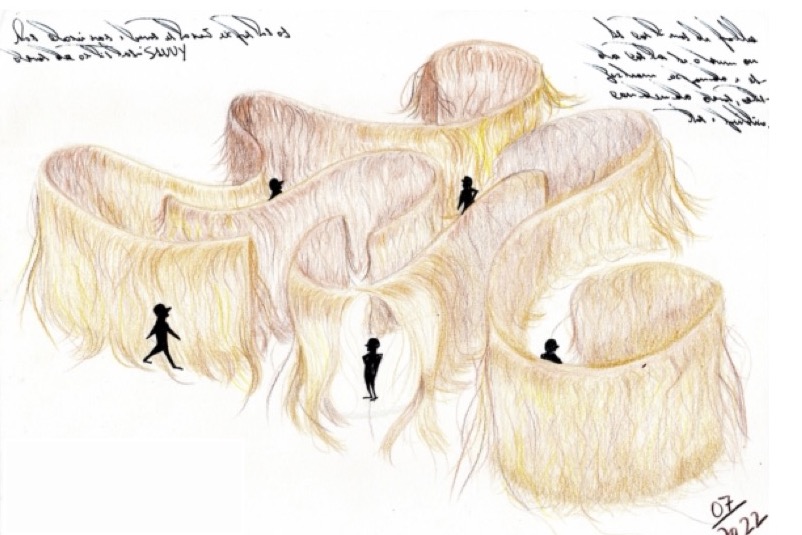WATA GO LEF STONE.
On the Perpetuity of Accara Across the Oceans

OFFERINGS
In the framework of “A parábola do Progresso”
OPENING 26.10.2022 18:00
OPEN 27.10.2022–02.04.2023 Tuesday–Saturday 10:00–21:00 Sunday 10:00–18:00
WITH Akinbode Akinbiyi, Diego Araúja and Laís Machado, Leo Asemota, Maria Magdalena Campos Pons, Simone Lagrand, Leda Martins, Awilda Sterling
AT Sesc Pompeia, São Paulo, Brazil
PUBLIC PROGRAMME
27.10.–28.10.2022 Roundtables with the exhibition territories
From the independent Republic of Palmares led by its great leader Zumbi, to the resistance movements in Bahia led by Luiza Mahin, to the long ongoing fights and resistances carried on by the over thousand Quilombos for the recognition of their land ownership, the presence and importance of Africans and African political movements in Brazil has a strong history which is echoing into our now. As Abdias do Nascimento states in the book Africans in Brazil. A Pan-African Perspective: "from the outset, history shows that Brazil is demographically and culturally an African country.” Although conventional histories generally omit the African-Brazilian heroes of the abolitionist cause, most of them such as Luiz Gama – poet and precursor of Negritude, and son of Luiza Mahin – derived from and used as main weapon in their fights their exceptionally lucid African consciousness, as writes Elisa Larkin Nascimento in the aforementioned book which she co-authored. An African consciousness rooted in the spirit of resilience that has travelled through time and space, a spirit of resilience which was sparked up and fueled by the need to enable spaces of togetherness, care and conviviality which go beyond the direct action of physical fight.
How to be convivial in a world that continues to be cruel? Which are the strategies of living and loving, of song and food and other forms of nourishment? Which are the “recipes” echoing between continents and archipelagos, rhythms and languages that keep providing re·sources of survival, community, resistance, joy, wellbeing?
WATA GO LEF STONE. ON THE PERPETUITY OF ACCARA ACROSS THE OCEANS is an acknowledgment of this resilience and consciousness rooted within the African context and spread out across its diasporas. It is an attempt to follow our pressing questions by understanding the water flows and other ways of being between the African continent and her diasporas – embracing the multiple, rhizomatic forms of making space and community through music, food, textiles, languages, and other patterns embodied and shared.
There is a saying in Cameroonian Pidgin English which goes: “Scratch ma back I scratch ya back”. In that sense, WATA GO LEF STONE. ON THE PERPETUITY OF ACCARA ACROSS THE OCEANS is an invitation to “scratch each others’ backs”, an invitation to togetherness, an invitation to collectively craft a space of conviviality vital to each and everyone of us and most especially now in this very tense context of upcoming elections in which Brazil finds itself.
In this idea of welcoming and being convivial, SAVVY Contemporary extends this initial invitation by Sesc Pompeia to the Brazilian artists Laís Machado and Diego Araúja to provide a structure, a time and memory capsule that will host and hold, set and define a rhythm to which the other artistic contributions will co-exist, interact and resonate. Through their vessel, we go on a journey into history which is always also going into the future – to follow the traces of the Accara across the ocean, connecting the West African coast with the Brazilian coast.
Together with interdisciplinary artists, scholars, and poets, WATA GO LEF STONE will breath and inhabit Sesc Pompeia in the framework “A parábola do Progresso” [Parable of the Progress]. Curated by Lisette Lagnado alongside associated curators André Pitol and Yudi Rafael, this exhibition debates the identity formation and modernization processes of the nation, questioning the idyllic image of the so-called “country of the future” that accompanies it since the invasion of the territory that today configures Brazil. In this sense, the exhibition intends, if not to subvert, at least to suspend the doctrine of Progress, a positivist principle that paved the way for cruel development policies. Another commonplace contested is the belief in a “hospitable nation” that disregards not only the historical violence of Portuguese colonization and the transatlantic traffic of millions of enslaved people – based on discourses and practices that are perpetuated in different ways in the present time – but also immigration as a project of whitening the country, with a view to its transformation into a modern nation.
SAVVY Contemporary has been invited as one of the territories to think along and expand notions and politics of hospitality alongside other dialogical spaces which participate as guest territories to showcase practices of hospitality and adversities: Acervo da Laje (Salvador, Bahia), Aldeia Indígena Kalipety (São Paulo), Casa do Povo (São Paulo) and Quilombo Santa Rosa dos Pretos (Maranhão), all located in Brazil.
SAVVY Team
Concept Billy Fowo, Anna Jäger, Lynhan Balatbat-Helbock
Curation Billy Fowo, Anna Jäger
Management Lema Sikod
Artistic Direction Bonaventure Soh Bejeng Ndikung
A parábola do Progresso Team
Curation Lisette Lagnado
Associate Curation André Pitol, Yudi Rafael
Production Management Ana Helena Curti
Production Team Carol Angelo, Gabriela Caetano, Paloma Cassari, Rodrigo Primo, Rodrigo Reis
Exhibition Design Tiago Guimarães
Curation PUBLIC-PROGRAM Cláudio Bueno, João Simões, Vânia Medeiros (Explode! Platform)
Parabol of the Progress is a project by Sesc São Paulo/ Brazil.
VISUAL Sketch of Sumidouro by Laís Machado and Diego Araúja – a vessel, a structure, a time and memory capsule that will host and hold, set and define a rhythm for the other artistic contributions.
